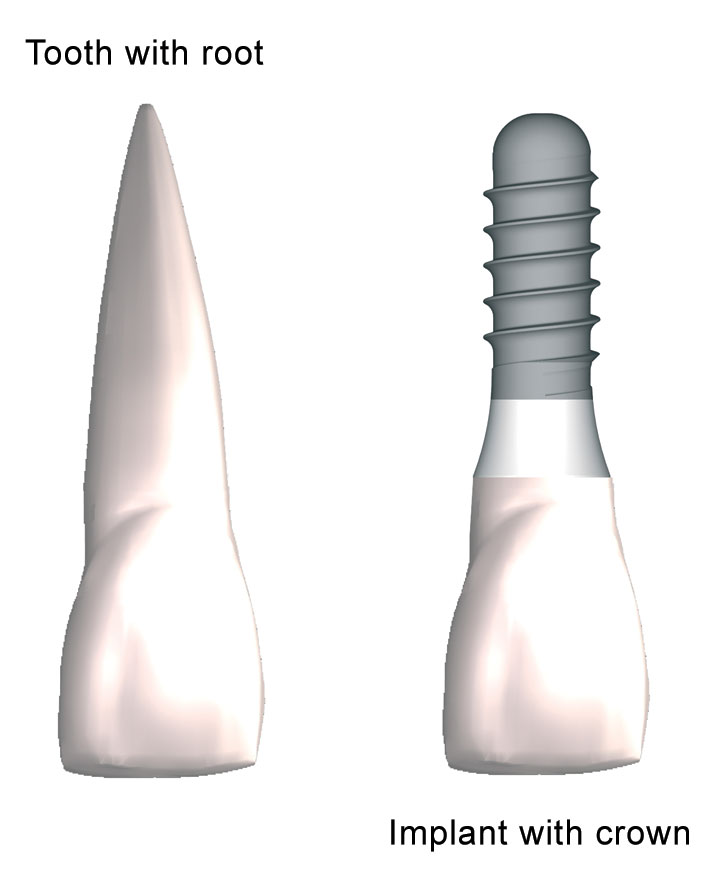
What are Dental Implants?
Replicating the natural function and appearance of your lost teeth can be very difficult to accomplish. Historically, dentures or bridge restorations would be used as replacements, but with limited results. Dental implants, however, are natural-looking replacements for missing teeth that also provide the same function as your natural tooth root. They have also been used to anchor these other types of restorations for greater success and patient satisfaction.
A More Natural Approach
A dental implant is a small, sturdy, titanium post that acts as the root structure would for a natural tooth. A dental implant is placed into your upper or lower jaw bone. After the bone has grown around the implant, implants can hold a crown, bridge or over-denture just like roots hold natural teeth in place. Implants are very durable and can last a lifetime. They require the same maintenance as natural teeth; this includes brushing, flossing and regular dental check-ups.
A single tooth or a full arch of teeth which have been lost due to injury or disease can be replaced with dental implants. Titanium metal is used because of its compatibility with bone and oral tissues.
Dental Implant History
Dental Implants were developed in 1952, in a laboratory in the university town of Lund, Sweden by Professor Per-Ingvar Brånemark, who had a “lucky” accident during bone grafting research. Much to his dismay, Dr. Brånemark discovered that it was impossible to recover any of the bone-anchored titanium microscopes he was using. The titanium plate had apparently bonded irreversibly to living bone tissue, an observation which contradicted all scientific theory at the time.
Dr. Brånemark went on to demonstrate that under carefully controlled conditions, titanium could be structurally integrated into living bone with a very high degree of predictability, and without long-term soft tissue inflammation or rejection. Brånemark coined the name “osseointegration,” meaning the attachment of healthy bone to a titanium implant.
Thus dental implants were born and the first application of dental osseointegration was the implantation of new titanium roots in an edentulous (toothless) patient in 1965. Dental implants have shown a 90 percent success rate and long-term studies continue to show improving success.
Reasons you may want to consider dental implants:
- To replace one or more teeth
- To provide support for a partial denture
- To increase the support and stability of full upper or lower denture
- To enhance chewing comfort
- To increase confidence while smiling, talking and eating
- To improve your overall psychological health
- To improve esthetic appearance and regain over all confidence
Dental Implants Davie
Summary
In 1952, the first dental implants were developed and since that time technology has taken leaps and bounds to give us the most modern solution for missing teeth. Dental implants restore optimum oral health, as well as confidence and hope to those who have suffered tooth loss.
Get a Free Dental Implant Davie Consultation
excerpts/info taken from dentalimplants.org
Add’l info provided by K&K Dentistry-Dental Implants Davie
Dental Implants Davie
 In Florida veneers can be life and appearance changing for the patient.
In Florida veneers can be life and appearance changing for the patient.
Custom designed to fit over the existing tooth, Florida veneers are a tooth-like enamel shell.
They can be used to fix small cracks and chips, cover up worn tooth enamel, and correct the appearance of uneven spacing or alignment. Able to solve most, if not all, of your cosmetic dental issues, dental veneers are made from porcelain or composite resin material. Reflecting light properties of natural teeth, porcelain veneers resist stains better than resin veneers. The removal of less of the tooth surface before placement is a plus of the thinner resin veneers.
A composite filling that is “white” in color and is an inexpensive “fix” for small cracks and chips is bonding. In order to fill in the chip or crack, a composite resin material is bonded to the tooth, this also helps to better protect the surrounding tooth structure. In cases that are more severe, however, veneers can be a far better solution.
An option for mildly discolored teeth is whitening. Although interested in veneers, some patients will find their Davie dentists recommending whitening.
All of the teeth that are to be fitted with the custom designed shells require “shaping” and “prepping” when getting veneers. It is not recommended for teeth that are esthetically and functionally adequate as it permanently alters the treated teeth.
Some procedures can require more invasive tooth preparation, such as crowns, and dental veneers can help to protect the surface of a damaged tooth, thus eliminating the need for the crown.
In Florida veneers are very thin, and because of this, they might need little – to -no reshaping when being bonded to the tooth. Veneers are pretty durable and strong once bonded into place, however, care must be taken to not take advantage of this durablility; the thin porcelain shell can damage or break. Staying away from certain hard foods like carrots or candy may be advised or it may be recommended that you wear a protective appliance while sleeping, especially for those who tend to grind their teeth.
Getting dental veneers in Florida offers the following advantages over other cosmetic procedures:
- They provide a natural tooth appearance.
- Porcelain is well-tolerated by gum issues
- Porcelain veneers are stain resistant.
- The color of a porcelain veneer can be selected so that it makes dark teeth appear whiter.
- Veneers offer a conservative approach to changing a tooth’s color and shape — veneers generally don’t require the extensive shaping prior to the procedure that crowns do, yet offer a stronger, more aesthetic alternative
After deciding that veneers are right for you consult your Davie dentists, Kocher & Kocher. You will be happy to know that we will have an open and informative conversation with you. This consultation will be your best way to decide if veneers are right for you. It is important to note that dental veneers may not always be practical as they are considered to not be medically necessary, but cosmetic.
The next step, if they are right for you, is to determine cost and what portion will be covered by insurance.